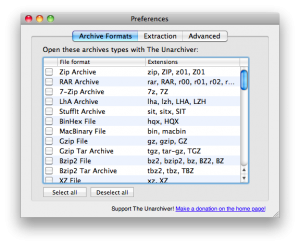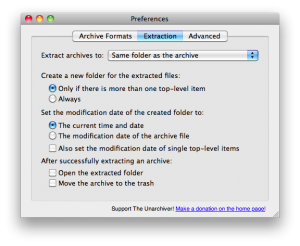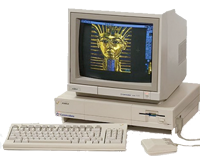Review: The Unarchiver for MacOS X
Archives… Don’t you just love ’em? A near instant way to glue a file structure together for distribution, or to simply save disk space or bandwidth – or all of the above. They’re not a new thing, and I’d guess that the unix TAR command and supporting format is probably one of the oldest, or possibly LHA. Or Zip… Who knows, and who really cares?
What is important is that archiving has been embraced for decades now, and there are myriad formats around: some are still alive, some are moribund, and some are locked into specific legacy platforms with little support in the modern world. Worse still in some people’s eyes is that some (and I’m looking at you here, RAR) use proprietary algorithms with no open solution to properly decode them.
And along comes The Unarchiver from Dag Ã…gren, which – as the apt app name suggests – looks to be the tool you need to extract stuff from your archives. It’s an open source, free, LGPL piece of software for MacOS X weighing in at 5.5MB of source and 4.5MB of executable. A command line version is available for Windows and Linux, should those be your predilection.
What does it do?
It unarchives, decompresses, extracts stuff. Zips, RARs, sits, tars, tgz… You name it, it probably is covered. But what is really interesting is that it’ll do just that to legacy formats, such as Amiga ADFs, DMS, LHA, etc. Of course it will only unarchive ADF or DMS files that contain a well known filesystem (Amiga OFS), but it does it. And it does it well.
Options, options
 This is a well considered application. At first run you select the file extensions you wish to associate with The Unarchiver – useful, as by default Mac OS X will take care of ZIP files and the like with the system default Archive Utility and you may want to keep such associations untouched.
This is a well considered application. At first run you select the file extensions you wish to associate with The Unarchiver – useful, as by default Mac OS X will take care of ZIP files and the like with the system default Archive Utility and you may want to keep such associations untouched.
You can also select how archives are extracted: where they’re extracted, whether they get their own directory – with an option to create a directory if there’s only more than one item in the archive’s root directory, which is neat -, what the timestamps should be, and whether to open the extracted folder and move the archive to trash. It’s all good, and well thought out.
With every format I tried, it simply worked. It deals with password protected archives as you’d expect (unlike UnRarX), it handles ADFs and DMSs well and if it’s not a DOS disk that you’re working with it tells you politely.
Conclusions
I really like this application, and it has become my default unarchiver on my mac for the simple reason that it just works. It’s interesting to note that the author has also written a file viewer compatible with the Amiga file formats… More on that elsewhere!
Author: Dag Ã…gren
Product homepage: http://wakaba.c3.cx/s/apps/unarchiver
Rating: 10/10 – does exactly what it should do, and well!

